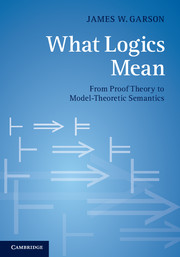Book contents
- Frontmatter
- Dedication
- Contents
- Preface
- Acknowledgements
- 1 Introduction to model-theoretic inferentialism
- 2 Deductive expression
- 3 Local expression
- 4 Global expression
- 5 Intuitionistic semantics
- 6 Conditionals
- 7 Disjunction
- 8 Negation
- 9 Supervaluations and natural semantics
- 10 Natural semantics for an open future
- 11 The expressive power of sequent calculi
- 12 Soundness and completeness for natural semantics
- 13 Connections with proof-theoretic semantics
- 14 Quantifiers
- 15 The natural semantics of vagueness (with Joshua D. K. Brown)
- 16 Modal logic
- Summary
- References
- Index
11 - The expressive power of sequent calculi
Published online by Cambridge University Press: 05 June 2014
- Frontmatter
- Dedication
- Contents
- Preface
- Acknowledgements
- 1 Introduction to model-theoretic inferentialism
- 2 Deductive expression
- 3 Local expression
- 4 Global expression
- 5 Intuitionistic semantics
- 6 Conditionals
- 7 Disjunction
- 8 Negation
- 9 Supervaluations and natural semantics
- 10 Natural semantics for an open future
- 11 The expressive power of sequent calculi
- 12 Soundness and completeness for natural semantics
- 13 Connections with proof-theoretic semantics
- 14 Quantifiers
- 15 The natural semantics of vagueness (with Joshua D. K. Brown)
- 16 Modal logic
- Summary
- References
- Index
Summary
We have shown that systems based on natural deduction rules do not (globally) express classical semantics; they select intensional rather than standard interpretations for the connectives. Although S& forces the classical reading, the rules for →, ↔, ∨, and ~ (whether classical or intuitionistic) pick out intuitionistic interpretations that are weaker than their classical ones. (See Chapters 6, 7, and 8.) It is well known that when local expression is the criterion at issue, the same “failing” does not apply to Gentzen sequent calculi with multiple conclusions (or sequent systems for short), for they are strong enough to force classical readings of the connectives. (See Shoesmith and Smiley (1978, p. 3) and Hacking (1979, p. 312).) That result is far from surprising, as we learned in Chapter 3 that even the natural deduction rules locally express the classical interpretation.
However, this leaves open the question as to whether the sequent rules globally express the classical truth conditions. At the end of Section 1.5, we gave a simple argument that the system G→~ deductively expresses the classical readings. Since every global model of a system is a deductive model of it, it follows that G→~ forces the classical conditions and so expresses them. In Section 11.1, that result will shown for a full range of sequent systems using a more powerful line of proof. This result has interesting consequences for our understanding of the relationships between natural deduction and sequent systems. Section 11.2 shows that it explains the “magical fact” (Hacking, 1979, p. 293) that when one restricts sequent rules to a single formula on the right-hand side, one obtains exactly intuitionistic (and not classical) propositional logic. In Section 11.3 it is shown that the distinction between global and local expression collapses for sequent systems, so that classical conditions forced by local models are exactly the ones forced by global models. Since we have argued in Section 3.5 that local expression is incompatible with an inferentialist account of connective meaning, sequent calculi forfeit a role in the project of this book. Another untoward feature of sequent systems was shown in Theorem 3.5. The only truth conditions that sequent rules can express are extensional. The collapse of global to local validity corresponds to a prejudice for extensional over intensional truth conditions. Section 11.4 will deploy these results to help adjudicate claims that classical systems are the only logics.
- Type
- Chapter
- Information
- What Logics MeanFrom Proof Theory to Model-Theoretic Semantics, pp. 162 - 176Publisher: Cambridge University PressPrint publication year: 2013



